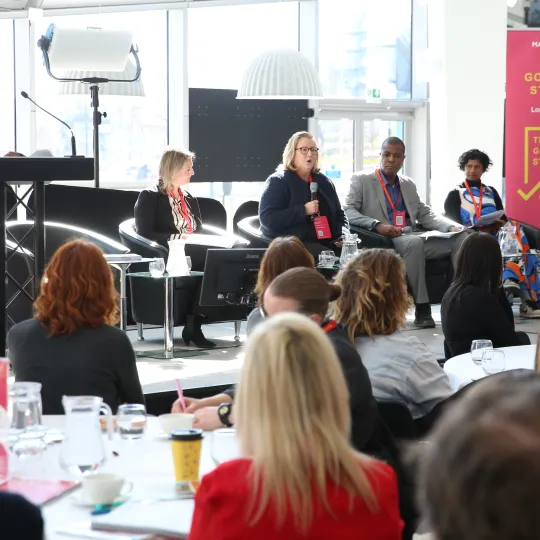
Skills and progression
Good employers build a workplace where people can develop, grow professionally and personally and where managers and leaders are supported to support their people.
Good employers actively build a workplace where employees are encouraged to grow and develop their skills and managers are supported to provide quality line management.
Organisations can act as ambassadors for either their sector or their communities, championing and promoting apprenticeships, lifelong learning opportunities and shaping industry skills needs.
A lack of career development continues to be a major cause of employee dissatisfaction and turnover. Having processes in place to support skills and career planning can help ensure that staff are motivated and feel satisfied by their jobs.

What best practice looks like
Getting started: statutory requirements and basic practices
To become accredited, employers must first complete an online foundation assessment which covers the minimum legal requirements and basic practices every employer should have in place.
Employers must meet the foundation criteria to move to the next stage.
The organisation identifies and manages health, safety and welfare at work risks
Management and leadership
- Managers understand their duty to protect the health, safety and welfare of their workers and take appropriate actions.
- Managers and leaders are informed and understand their roles and responsibilities.
- Managers and leaders lead by example and ensure that everyone in the organisation is treated with trust and respect.
- Clear objectives are set for workers, and managers provide regular feedback on their progress.
- Managers promote learning and development opportunities throughout the organisation.
Skills and development
- New starters in the organisation undertake an induction process.
- On-the-job training is offered to ensure that workers have adequate core skills to complete their role.
- Training and skills development activities are scheduled during working hours wherever possible.
- Workers and employees are paid for time spent travelling to and from training that is required by the employer
- Training and development rights are clearly communicated to the workforce. This includes the right to request time off for training or study.
- The organisation pays the apprenticeship levy if payroll is greater than £3m.
- The organisation ensures all apprenticeships last a minimum of 12 months and provide 20% off-the- job training.
In-work progression
- Clear job descriptions and responsibilities are communicated to everyone in the workforce.
- Progression opportunities such as promotions, secondments or other career development opportunities are open to everyone in the workforce.
- Feedback on performance, development and progression is regularly given to everyone in the workforce.


Next steps: benchmarking your organisation's practices
Once employers have successfully completed the foundation stage, they can complete the full self-assessment which assesses organisations against different criteria across the four pillars.
Microbusinesses can only be awarded at ‘achievement’ level - as it does not contain any ‘excellence’ criteria. Small, medium and large businesses can instead be awarded at 'achievement' or 'excellence' level.
Microbusiness must meet all criteria to accredit. Small, medium, and large businesses must meet a threshold but do not need to meet all criteria.
Microbusinesses
- There are regular opportunities to discuss personal development and progression.
- Training and upskilling opportunities are available to all staff.
Small, medium and large businesses
Management and leadership
- A performance management framework or approach has been developed and all people in the workforce have the opportunity for regular 1:1 conversations with their managers.
- Line managers have appropriate training to support their personal development and performance. For example, giving performance feedback, carrying out appraisals, and attendance.
- Managers and leaders have access to learning and training across a range of other topics relevant to the organisation. For example, recruitment, workforce dialogue, diversity and inclusion.
- People management and development practices in your organisation are enhanced through workforce feedback. For example this can include regular staff survey questions.
Skills and development
- The organisation hosts apprenticeships or training opportunities as pathways into employment in the organisation. These roles should include flexible working options where possible.
- There is a structured programme of training and development accessible and available to everyone in the organisation.
- Informal training and transferable skills gained outside of work, such as through volunteering, are recognised and counted in personal development plans.
- Workers and employees are granted paid time off to pursue union-led learning opportunities (if the organisation has a recognised trade union).
- Actions are taken by the organisation to maximise the use of the apprenticeship levy allowance.
In-work progression
- There are clear progression pathways, levels or systems for promotions and pay growth in the organisation.
- There is a system for supporting development of workers in the organisation. For example, development plans, regular performance reviews and/or appraisals.
- The organisation actively supports the progression of underrepresented or disadvantaged groups within the organisation, including women, through dedicated positive programmes. For example mentoring, leadership or sponsorship programmes.
Management and leadership
- Managers’ key competencies and development objectives have an explicit focus on team and individual learning and development.
- Managers and supervisors are trained or are knowledgeable in managing conflict and difficult conversations, or can help workers to access support within the organisation.
- Managers regularly receive feedback from multiple sources as part of their development plans. For example, 360 feedback.
- Managers and leaders have access to accredited training.
Skills and development
- The organisation offers accredited and widely recognised training that encourages lifelong learning beyond the skills requirements for the job and improves prospects for career progression.
- The organisation proactively identifies future skills and training needs through skills and career planning processes.
- The organisation promotes apprenticeships. For example, through a recognised apprenticeship promotion programme.
- The organisation offers supported internships to young people with special educational needs and disabilities.
- The organisation collaborates with local colleges and/ or training providers to shape training provision and meet industry needs.
- An allowance of volunteering leave is provided.
- Employer Supported Volunteering (ESV) is promoted within the organisation.
In-work progression
- Regular development reviews focus on long-term career progression and skills development beyond current job requirements.
- Workers and employees have access to other career enhancing roles and opportunities in the organisation to gain broader experience. For example, rotations, secondments or internal transfers.
- The organisation has put in place a mentoring, reverse mentoring or coaching scheme between senior and junior members of the workforce.
- The organisation undertakes workforce planning and reviews team structures and job design to ensure that roles are well-designed and provide opportunities for skills development and career progression.
How to improve your practices

Explore guidance and resources
Explore our collection of resources, including employer guidance, toolkits and case studies all created to help you put good employment practices into action and achieve the Good Work Standard criteria in this pillar.

Below are some of the other London and UK-based programmes that help employers demonstrate their commitment to good work practices and employee wellbeing in the skills and progression pillar.
Explore the other pillars
Contact us
If you have questions or would like to find out more about becoming a Good Work Standard employer, contact the Economic Fairness Team.
Need a document on this page in an accessible format?
If you use assistive technology (such as a screen reader) and need a version of a PDF or other document on this page in a more accessible format, please get in touch via our online form and tell us which format you need.
It will also help us if you tell us which assistive technology you use. We’ll consider your request and get back to you in 5 working days.